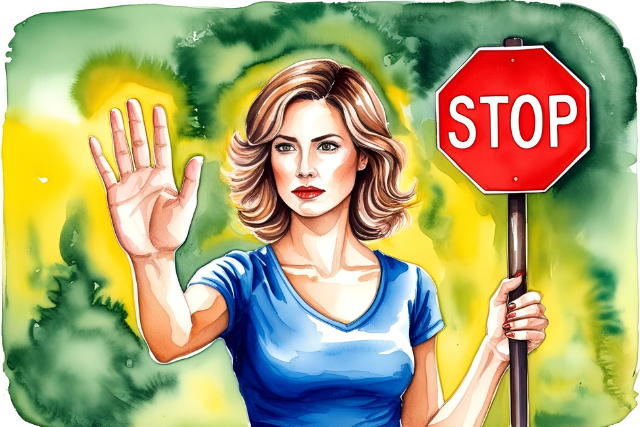
“Being a very good individual doesn’t imply being a doormat… You might be type, giving, and full of affection, however that doesn’t imply you must settle for disrespect or permit your boundaries to be crossed.” ~Unknown
I can nonetheless vividly keep in mind sitting in my seventh-grade classroom, forcing amusing as my classmates made jokes at my expense. My cheeks would burn crimson, however I’d smile alongside, desperately eager to belong. For years, I mistook my silence for kindness, my nervous laughter for good nature. I didn’t understand that by laughing at myself, I used to be slowly chipping away at my very own self-worth.
Rising up, I used to be the “good child”—the one who by no means brought on hassle, by no means talked again, and at all times tried to maintain the peace. When somebody would make a reducing comment about my look or mock the way in which I spoke, I’d reply with a practiced smile and a halfhearted chuckle. I believed this made me mature, diplomatic even. “Simply brush it off,” my mom would say. “They’re solely joking.” However deep inside, every chuckle felt like a small betrayal of myself.
The sample continued properly into my teenage years. In each social circle, I turned the designated “good sport”—the one who might take any joke, regardless of how sharp its edges. I wore this label like a badge of honor, by no means realizing it was really a protect I used to be hiding behind. My incapability to face up for myself wasn’t kindness; it was worry dressed up as politeness.
The turning level got here throughout my first yr of faculty. Throughout a gaggle mission, a teammate made a very merciless joke about my work ethic. As normal, I began to chuckle, however one thing inside me snapped.
Years of suppressed emotions bubbled to the floor, and for the primary time, I heard how hole my laughter sounded. In that second, I noticed I wasn’t being good—I used to be being complicit in my very own diminishment.
This revelation led me down a path of self-discovery and private development. By way of remedy, self-help books, and numerous conversations with trusted associates, I started to know the distinction between being type and being a doormat. I realized that standing up for your self doesn’t make you imply or confrontational—it makes you self-respecting.
Listed here are the very important classes I realized alongside my journey:
Step one was the toughest: acknowledging that my laughter was a protection mechanism, not an indication of resilience. I needed to settle for that it’s okay to not discover hurtful feedback humorous. Actual power isn’t in laughing off insults; it’s in acknowledging when one thing hurts and addressing it straight.
I began practising easy phrases in entrance of the mirror: “I don’t discover that humorous,” “That remark was inappropriate,” or just, “Please don’t converse to me that manner.” At first, these phrases felt overseas on my tongue, however steadily, they turned a part of my vocabulary. I realized that confrontation doesn’t need to be aggressive—it may be calm, dignified, and agency.
Essentially the most shocking discovery was how many individuals revered me extra once I began setting boundaries. Those that really cared about me adjusted their habits. Those that didn’t, properly, they confirmed their true colours, and I realized that not each relationship must be preserved at the price of your self-respect.
Right this moment, I nonetheless contemplate myself a sort individual, however my kindness now not comes on the expense of my dignity. I’ve realized that true niceness isn’t about accepting poor remedy; it’s about treating others—and your self—with respect.
When somebody makes a hurtful remark now, I now not attain for laughter as a protect. As an alternative, I stand tall in my reality and converse up with compassion and readability.
To those that acknowledge themselves in my story—those that chuckle after they need to cry, who smile after they need to scream—I need you to know that your emotions matter. Your discomfort is legitimate. Your voice deserves to be heard. Being good doesn’t imply being silent, and standing up for your self doesn’t make you any much less type.
The journey from compelled laughter to genuine self-expression isn’t simple. It’s full of uncomfortable moments and difficult conversations. However with every small act of standing up for your self, you rebuild your self-worth piece by piece. You be taught that the strongest type of kindness is the type you present your self.
Bear in mind: You might be each good and powerful, each type and assertive. The actual magic occurs while you discover that steadiness—when you’ll be able to face the world with a real smile, understanding you’ll by no means once more chuckle on the expense of your personal dignity.
About Kalyani Abhyankar
Kalyani Abhyankar is a professor of regulation and mindset coach, specializing in administrative regulation and client safety. She is captivated with serving to others domesticate a limitless mindset and private development by way of her work on LinkedIn and past.



